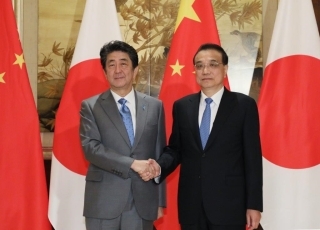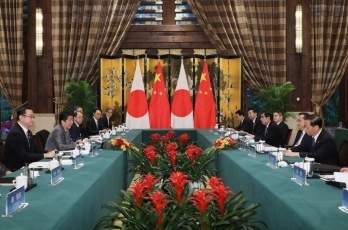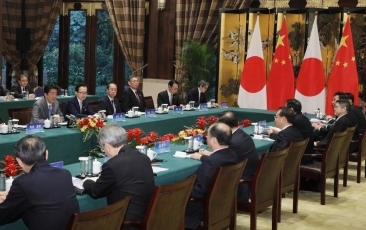Japan-China Relations
Japan-China Summit Meeting and Working Lunch
(Premier Li Keqiang of the State Council)
December 25, 2019
 Japan-China Summit Meeting with the Premier of the People’s Republic of China
Japan-China Summit Meeting with the Premier of the People’s Republic of China(Photo: Cabinet Public Relations Office)
 Japan-China Summit Meeting with the Premier of the People’s Republic of China
Japan-China Summit Meeting with the Premier of the People’s Republic of China(Photo: Cabinet Public Relations Office)
 Japan-China Summit Meeting with the Premier of the People’s Republic of China
Japan-China Summit Meeting with the Premier of the People’s Republic of China(Photo: Cabinet Public Relations Office)
On December 25, commencing at around 10 a.m. local time (around 11 a.m. JST), Mr. Shinzo Abe, Prime Minister of Japan, who is visiting Chengdu in the People’s Republic of China to attend the Japan-China-ROK Trilateral Summit meeting, held a Japan-China Summit meeting (for approximately 50 minutes, simultaneous interpretation) and lunch (for approximately 55 minutes, consecutive interpretation) with H.E. Mr. Li Keqiang, Premier of the State Council of China. The overview of the meeting and lunch is as follows.
- 1. Opening Remarks
- 2. Overview of Japan-China Relations
- 3. Economic and Practical Cooperation
- 4. People-to-People and Cultural Cooperation
- 5. Matters of Concern to the International Community
- 6. Regional and International Cooperation
- 7. North Korean Affairs
1. Opening Remarks
(1) The overview of Premier Li’s opening remarks is as follows
- I am happy to see you in Dujiangyan in Sichuan Province. When I visited Japan last year, you accompanied me to Hokkaido, and we visited a number of facilities. It has left a deep impression on me. After this meeting, we will tour Dujiangyan. This is my way of showing hospitality.
- Yesterday, we both attended the Eighth Japan-China-ROK Trilateral Summit meeting that was held successfully. We were able to confirm our three countries’ outlook for the next ten years. We demonstrated that the three countries will promote multilateralism and free trade and maintain stability, security, and peace in the region. I appreciate that you yourself have made efforts and provided support for the Japan-China-ROK Trilateral Summit meeting held in China.
- The momentum for improving Japan-China relations has been maintained, and the relationship has gotten back onto a normal track through last year’s reciprocal visits by the leaders. Japan-China relations have gotten back onto a normal track for taking history as a mirror and looking toward the future, based on the principles established in the four political documents between Japan and China. I look forward to the sound development of and new developments in Japan-China relations. Japan and China are leading world economic powers as well as trading partners. The trade amount between the two countries has grown significantly amid the downward pressure on world economic growth. More than 11 million people have visited each other’s countries. China intends to strengthen investment, innovation, and third country market cooperation, expand people-to-people and cultural exchanges, and in cooperation with Japan, expand the market for the service industry, such as finance, securities, life insurance, and medical and nursing care. China will select pilot districts for market opening and make them a driving force for growth. Here, Chengdu, will be a good option for such districts.
- I wish to convey my congratulations for the successful Trilateral Summit meeting. Under your strong leadership, the meeting made significant achievements on the 20th anniversary of the trilateral cooperation. I am very pleased that I was able to attend the meeting with you as I promised during my visit to China in October of last year.
- At yesterday’s Summit, I spoke about the direction of the trilateral cooperation, focusing on the environment, aging society, and people-to-people exchanges. We had a very meaningful discussions. It was an excellent meeting leading into the Ninth Japan-China-ROK Trilateral Summit meeting. Once again, I would like to express my respect for your leadership.
- I would like to express my wholehearted appreciation for your warm and thoughtful hospitality, including inviting me to the highly scenic area of Mount Qingcheng and personally accompanying me to Dujiangyan following this meeting and inviting me to a working lunch today.
- Japan-China relations are making steady improvements. In order to make President Xi’s State Visit to Japan next spring successful, I look forward to exchanging views candidly from a broad perspective with Premier Li in this calm atmosphere.
2. Overview of Japan-China Relations
(1) The two sides reflected once again that the Japan-China relationship had gotten back onto a “normal track” following the reciprocal visits between the leaders since last year. The two sides shared their determination to maintain communications in the lead-up to President Xi’s visit to Japan next spring and carve out “a new era of Japan-China relations.”
(2) Prime Minister Abe stated that Japan and China have a significant responsibility toward peace, stability, and prosperity of the region and the world, and expressed his desire to send out a clear message both domestically and internationally of their intention to fulfill this responsibility. In addition, Prime Minister Abe expressed his determination to continue “ceaseless exchanges,” based on the need to strengthen and firmly establish reciprocal visits and dialogues at the high level, ensuring that the current momentum for improving and deepening Japan-China relations is not temporary.
(3) Based on the view that “there will be no genuine improvement in Japan-China relations without stability in the East China Sea,” Prime Minister Abe strongly requested China’s responses to the East China Sea issue, including waters surrounding the Senkaku Islands.
(2) Prime Minister Abe stated that Japan and China have a significant responsibility toward peace, stability, and prosperity of the region and the world, and expressed his desire to send out a clear message both domestically and internationally of their intention to fulfill this responsibility. In addition, Prime Minister Abe expressed his determination to continue “ceaseless exchanges,” based on the need to strengthen and firmly establish reciprocal visits and dialogues at the high level, ensuring that the current momentum for improving and deepening Japan-China relations is not temporary.
(3) Based on the view that “there will be no genuine improvement in Japan-China relations without stability in the East China Sea,” Prime Minister Abe strongly requested China’s responses to the East China Sea issue, including waters surrounding the Senkaku Islands.
3. Economic and Practical Cooperation
(1) The two sides shared the view on further promoting economic and practical cooperation in areas in which they have shared interests and agree on the direction. Prime Minister Abe expressed his expectations for robust efforts toward enhancing the business environment, such as by improving the implementation of legal systems, further opening up the market, and strengthening Japan-China financial cooperation. Premier Li expressed his intention to further enhance Japan-China economic relations through promotion of market opening.
(2) Regarding the issue of import restrictions on Japanese food products, Prime Minister Abe strongly requested China’s forward-looking response for its early removal of import restrictions, expanding rice exports, and resuming beef exports. With regard to beef, Prime Minister Abe appreciated China’s announcement on December 19 regarding removal of an import ban, noting that it is a positive measure, and expressed his intention to further accelerate coordination between their authorities for the swift resumption of exports to China.
(3) Regarding cooperation in third country markets, the two sides confirmed that they will continue discussing establishment of concrete projects. Prime Minister Abe emphasized the importance of meeting international standards, such as openness, transparency, economic efficiency, and debt sustainability, and stated that in this light the endorsement of the “G20 Principles for Quality Infrastructure Investment” at the G20 Summit in Osaka marked a major step forward.
(4) The two sides exchanged views regarding innovation cooperation and protection of intellectual property rights. Prime Minister Abe stated that protecting intellectual property, including data handling, and making other environmental improvements were vital for promoting innovation.
(5) The two sides confirmed that they will seek an early conclusion of the Regional Comprehensive Economic Partnership (RCEP), based on which both will make efforts to advance the negotiations on the Japan-China-ROK Free Trade Agreement (FTA). Furthermore, Prime Minister Abe underscored the importance of signing RCEP among 16 countries, including India.
(2) Regarding the issue of import restrictions on Japanese food products, Prime Minister Abe strongly requested China’s forward-looking response for its early removal of import restrictions, expanding rice exports, and resuming beef exports. With regard to beef, Prime Minister Abe appreciated China’s announcement on December 19 regarding removal of an import ban, noting that it is a positive measure, and expressed his intention to further accelerate coordination between their authorities for the swift resumption of exports to China.
(3) Regarding cooperation in third country markets, the two sides confirmed that they will continue discussing establishment of concrete projects. Prime Minister Abe emphasized the importance of meeting international standards, such as openness, transparency, economic efficiency, and debt sustainability, and stated that in this light the endorsement of the “G20 Principles for Quality Infrastructure Investment” at the G20 Summit in Osaka marked a major step forward.
(4) The two sides exchanged views regarding innovation cooperation and protection of intellectual property rights. Prime Minister Abe stated that protecting intellectual property, including data handling, and making other environmental improvements were vital for promoting innovation.
(5) The two sides confirmed that they will seek an early conclusion of the Regional Comprehensive Economic Partnership (RCEP), based on which both will make efforts to advance the negotiations on the Japan-China-ROK Free Trade Agreement (FTA). Furthermore, Prime Minister Abe underscored the importance of signing RCEP among 16 countries, including India.
4. People-to-People and Cultural Cooperation
(1) The two sides welcomed the active tourism exchanges between Japan and China, and shared the view on further encouraging reciprocal visits between the people of both countries.
(2) The two sides shared the view on making next year the “Japan-China Culture and Sports Exchange Promotion Year,” and confirmed that tangible opportunities for exchanges will be established through the Summer Games in Tokyo next year and the Winter Games in Beijing in 2022. In addition, the two sides shared the view on continuing the promotion of youth exchanges.
(2) The two sides shared the view on making next year the “Japan-China Culture and Sports Exchange Promotion Year,” and confirmed that tangible opportunities for exchanges will be established through the Summer Games in Tokyo next year and the Winter Games in Beijing in 2022. In addition, the two sides shared the view on continuing the promotion of youth exchanges.
5. Matters of Concern to the International Community
Prime Minister Abe explained Japan’s position regarding issues attracting great attentions of the international community, such as the South China Sea issue and the situation in Hong Kong.
6. Regional and International Cooperation
(1) Prime Minister Abe expressed his expectations to further “reforms and opening-up” by China.
(2) Regarding trade and investment, Prime Minister Abe expressed his intention to make joint efforts with China toward leveling the playing field and expanding the free and fair economic area. The two sides also exchanged views regarding RCEP.
(2) Regarding trade and investment, Prime Minister Abe expressed his intention to make joint efforts with China toward leveling the playing field and expanding the free and fair economic area. The two sides also exchanged views regarding RCEP.
7. North Korean Affairs
The two sides exchanged views regarding North Korean affairs, including the recent situation. Prime Minister Abe noted the importance of North Korea’s exercise of self-restraint from further provocations. The two sides then shared the view on the importance of coordinating toward the denuclearization of the Korean Peninsula, a goal shared by Japan and China, and of fully implementing United Nations Security Council resolutions.
